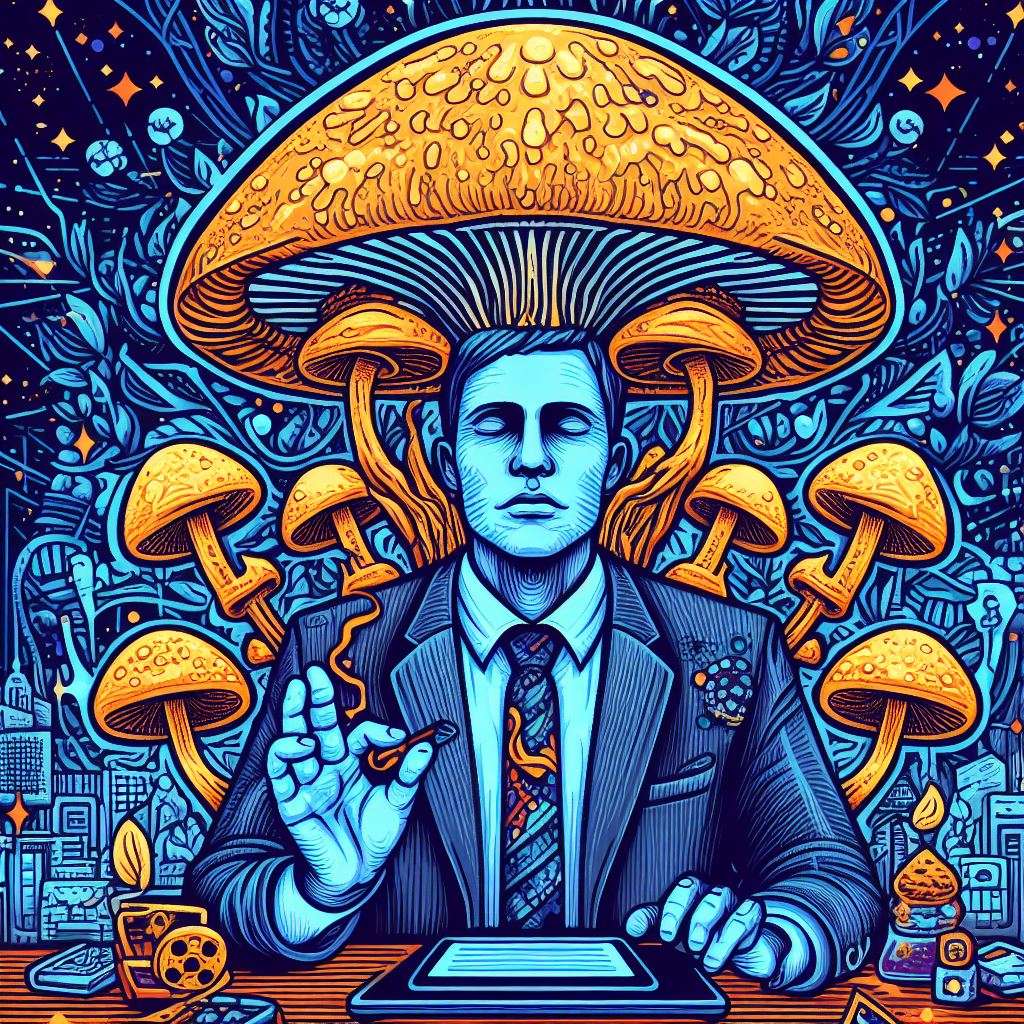Psilocybin, a naturally occurring psychedelic compound found in certain species of mushrooms, has gained significant attention in recent years for its potential therapeutic effects. As researchers delve deeper into the study of psychedelics, there is growing evidence to suggest that psilocybin may hold promise in helping individuals heal from trauma and improve their mental well-being. This article explores five reasons why a psilocybin retreat can be a transformative experience for those seeking healing and recovery from trauma.
Before delving into the reasons, let’s first understand what a psilocybin retreat entails and how it works. A psilocybin retreat is a guided therapeutic experience that takes place in a controlled and supportive environment. Participants consume psilocybin mushrooms under the guidance of trained professionals who provide psychological support throughout the journey. These retreats typically last for several days and offer a structured program that combines therapy, integration sessions, and mindfulness practices.
Trauma, whether stemming from a single distressing event or long-term exposure to adverse experiences, can have profound effects on mental health. It often leads to symptoms such as anxiety, depression, and post-traumatic stress disorder (PTSD). Traditional therapeutic approaches, while helpful for many, may not always provide the breakthrough needed to address deeply rooted trauma. This is where psilocybin retreats come into the picture, offering a potentially transformative healing experience.
By harnessing the power of psilocybin, individuals have the opportunity to explore their inner world and gain new insights into their trauma. Now, let’s dive into the five reasons why a psilocybin retreat can be an effective tool for healing trauma.
Psilocybin can help individuals process repressed emotions
One of the significant ways psilocybin can aid in healing trauma is by assisting individuals in processing repressed emotions. Traumatic experiences often leave deep emotional wounds that can be challenging to access and address through conventional therapy alone. Psilocybin, with its ability to induce altered states of consciousness, has shown promise in facilitating the exploration and release of these suppressed emotions.
Psilocybin affects the brain by interacting with serotonin receptors, particularly the 5-HT2A receptors. This interaction leads to increased neural activity and the formation of new connections within the brain. In the context of trauma, psilocybin can help bypass the typical defense mechanisms and open pathways to deeply buried emotions and memories.
Several studies have demonstrated psilocybin’s potential in facilitating emotional processing. For example, a study conducted at Imperial College London found that psilocybin-assisted therapy resulted in significant reductions in depression and anxiety symptoms among individuals with treatment-resistant depression. Participants reported a newfound ability to confront and integrate difficult emotions related to past traumas, leading to long-lasting improvements in their mental well-being.
Another study published in the Journal of Psychopharmacology explored the effects of psilocybin on individuals with severe and chronic PTSD. The results showed that psilocybin-assisted therapy led to a significant reduction in PTSD symptoms, with some participants experiencing a complete remission. Participants reported enhanced emotional processing, increased self-compassion, and a greater sense of acceptance and integration of their traumatic experiences.
It is important to note that psilocybin retreats are conducted in a structured and supportive environment, with trained professionals guiding participants throughout the journey. This guidance helps individuals navigate their emotional landscapes and provides a safe container for processing and integrating challenging emotions that may arise during the psychedelic experience.
While further research is still needed to fully understand the mechanisms underlying psilocybin’s impact on emotional processing, the existing evidence suggests that it holds great potential in helping individuals heal from trauma by facilitating the release and integration of repressed emotions.
Psilocybin can increase feelings of connection and empathy
Another compelling reason why a psilocybin retreat can help heal trauma is its ability to increase feelings of connection and empathy. Trauma often leaves individuals feeling isolated, disconnected, and emotionally distant from others. Psilocybin, as a potent psychedelic compound, has the potential to enhance social cognition and promote a sense of connection with oneself, others, and the world at large.
Psilocybin affects the brain by modulating various neurotransmitter systems, including serotonin and dopamine. This modulation can lead to alterations in brain connectivity and communication, resulting in a heightened state of consciousness and altered perception of self and others. As a result, individuals may experience a profound sense of unity, interconnectedness, and empathy during the psilocybin experience.
Studies have shown promising results regarding psilocybin’s impact on social cognition. For instance, research conducted at the University of Zurich found that psilocybin increased participants’ empathy and prosocial behavior. Participants demonstrated greater emotional empathy, an increased ability to understand and share the emotions of others, and a willingness to help and cooperate with others. These findings suggest that psilocybin may foster a deeper sense of empathy and connection, which can be particularly beneficial for individuals struggling with the aftermath of trauma.
Furthermore, psilocybin has been shown to activate brain regions associated with self-referential processing, such as the default mode network (DMN). The DMN is involved in self-reflection, autobiographical memory, and social cognition. By enhancing the functioning and connectivity of the DMN, psilocybin may facilitate a more holistic and compassionate understanding of oneself and others, allowing for a profound shift in perspective and healing of interpersonal wounds.
In the context of trauma, increased feelings of connection and empathy can help individuals rebuild trust, strengthen relationships, and overcome the sense of isolation and disconnection that often accompanies traumatic experiences. The enhanced social cognition experienced during a psilocybin retreat can provide individuals with a fresh perspective on their relationships and foster a deeper sense of compassion and understanding towards both themselves and others.
It is essential to emphasize that psilocybin retreats provide a structured and supportive environment, with trained professionals guiding participants through their journey. This setting ensures that the increased feelings of connection and empathy are integrated into the individual’s healing process and provide a foundation for lasting change and growth.
Psilocybin can promote neuroplasticity in the brain
Neuroplasticity, the brain’s remarkable ability to reorganize and form new neural connections, plays a crucial role in the healing process from trauma. Traumatic experiences can leave a lasting impact on the brain, altering its structure and function. However, studies suggest that psilocybin, the key compound in psychedelic mushrooms, may promote neuroplasticity, offering a pathway for healing and recovery.
Psilocybin interacts with serotonin receptors in the brain, particularly the 5-HT2A receptors. This interaction leads to changes in brain activity and connectivity. It has been observed that psilocybin increases the flexibility and plasticity of neural networks, allowing for the formation of new connections and the rewiring of existing ones.
Research conducted at the Center for Psychedelic and Consciousness Research at Johns Hopkins University demonstrated the potential of psilocybin to promote neuroplasticity. In a study using functional magnetic resonance imaging (fMRI), researchers found that psilocybin led to an increase in global connectivity within the brain. This increased connectivity was associated with a reduction in symptoms of depression and anxiety and an overall improvement in psychological well-being. The findings suggest that psilocybin may enhance the brain’s capacity for adaptive change and neuroplasticity, offering a promising avenue for healing trauma-related neural disruptions.
Moreover, psilocybin has been shown to stimulate the growth of new neurons and support neurogenesis. A study published in Experimental Brain Research found that psilocybin administration increased the production of brain-derived neurotrophic factor (BDNF), a protein that promotes the growth and survival of neurons. This suggests that psilocybin may have the potential to facilitate the regeneration and repair of neural pathways damaged by trauma.
By promoting neuroplasticity, psilocybin may help individuals break free from maladaptive patterns of thinking, emotional reactivity, and negative self-perceptions that often result from trauma. The increased flexibility and rewiring of neural networks can support the integration of new perspectives, adaptive coping strategies, and positive behavioral changes, leading to lasting healing and transformation.
It is crucial to note that psilocybin retreats provide a controlled and supportive environment for individuals to undergo this neuroplasticity-promoting experience. Trained professionals guide participants through their journey, ensuring their safety and providing integration support to maximize the therapeutic benefits.
Psilocybin can reduce symptoms associated with PTSD
Post-traumatic stress disorder (PTSD) is a debilitating mental health condition that often occurs as a result of experiencing or witnessing a traumatic event. Traditional treatments for PTSD, such as psychotherapy and medication, may not always provide sufficient relief for all individuals. However, emerging research suggests that psilocybin, when used in a therapeutic context, may offer a novel and effective approach for reducing symptoms associated with PTSD.
PTSD is characterized by symptoms such as intrusive memories, flashbacks, nightmares, hypervigilance, and avoidance behaviors. These symptoms can significantly impair an individual’s quality of life and overall well-being. Clinical trials have shown promising results in using psilocybin-assisted therapy as a potential treatment for PTSD.
A study conducted at New York University Grossman School of Medicine explored the effects of psilocybin-assisted therapy on individuals with treatment-resistant PTSD. The findings revealed that a single dose of psilocybin, combined with therapeutic support, resulted in significant reductions in PTSD symptoms. Participants reported a decrease in the severity and frequency of intrusive memories and a reduction in anxiety and depression related to their traumatic experiences.
The unique properties of psilocybin, such as its ability to induce altered states of consciousness and facilitate emotional processing, make it a promising candidate for addressing the core symptoms of PTSD. Psilocybin’s impact on the brain, particularly its effects on neural connectivity and emotional regulation, may help individuals confront and reevaluate traumatic memories in a safe and supportive environment.
It is important to note that psilocybin-assisted therapy for PTSD should always be conducted within a structured and controlled setting, with trained professionals guiding the process. This ensures the safety of the participants and maximizes the therapeutic benefits of the experience.
While further research is needed to fully understand the long-term effects and optimal protocols for using psilocybin in the treatment of PTSD, the current evidence suggests that it holds promise as a potential breakthrough therapy for individuals struggling with the debilitating symptoms of this disorder.
A guided retreat setting can provide a safe space for healing
When embarking on a journey to heal from trauma, having a safe and supportive environment is paramount. A guided psilocybin retreat offers precisely that—an environment carefully designed to provide individuals with a secure space for their healing process. This structured setting, facilitated by trained professionals, offers a range of benefits that contribute to the transformative potential of a psilocybin retreat.
Traumatic experiences can be deeply distressing, and discussing them in a supportive environment is crucial for the healing process. During a guided psilocybin retreat, participants have the opportunity to work through their trauma with the guidance of experienced therapists or facilitators who understand the complexities of trauma and provide compassionate support.
These professionals play a crucial role in creating a safe container for participants to explore their emotions and memories. They help establish trust and rapport, ensuring that individuals feel comfortable and supported throughout their psilocybin journey. This supportive presence can be instrumental in helping participants navigate challenging emotions, providing reassurance, and facilitating integration after the retreat.
Additionally, the retreat setting itself is carefully designed to promote healing. Retreat centers often provide a serene and natural environment, away from the distractions and stressors of everyday life. This setting allows individuals to immerse themselves in the retreat experience fully, fostering introspection and self-reflection.
Moreover, the structured nature of a psilocybin retreat provides a framework for the healing process. Retreat programs typically include preparatory and integration sessions that bookend the psychedelic experience. Preparatory sessions help individuals set intentions, understand the process, and address any concerns or questions they may have. Integration sessions, on the other hand, allow participants to reflect on and integrate their experiences into their daily lives, reinforcing the insights and healing gained during the retreat.
The combination of a supportive therapeutic presence, a carefully designed environment, and a structured program makes a guided psilocybin retreat an ideal space for healing trauma. Participants can feel safe, understood, and empowered to delve into the depths of their trauma and emerge with a renewed sense of self and purpose.
Conclusion
In conclusion, a psilocybin retreat holds significant potential as a therapeutic tool for healing trauma. We have explored five key reasons why a psilocybin retreat can aid individuals in their journey towards healing and recovery.
First, psilocybin can help individuals process repressed emotions related to trauma. Through its impact on the brain, psilocybin facilitates the exploration and release of deeply buried emotions, leading to long-lasting improvements in mental well-being.
Second, psilocybin increases feelings of connection and empathy. By enhancing social cognition, psilocybin fosters a sense of unity and interconnectedness, which can be transformative for individuals who feel isolated and disconnected due to trauma.
Third, psilocybin promotes neuroplasticity in the brain. By rewiring neural networks and stimulating neurogenesis, psilocybin offers a potential pathway for healing trauma-related neural disruptions and facilitating adaptive change.
Fourth, psilocybin shows promise in reducing symptoms associated with PTSD. Clinical trials have demonstrated its effectiveness in alleviating intrusive memories, anxiety, and depression related to traumatic experiences.
Finally, a guided retreat setting provides a safe space for healing. Trained professionals and a structured environment ensure that individuals feel supported and secure throughout their psilocybin journey, facilitating a transformative and therapeutic experience.
As the field of psychedelic therapy continues to advance, it is important to conduct further research to better understand the mechanisms underlying psilocybin’s therapeutic effects and refine treatment protocols. Rigorous studies and continued exploration will contribute to the integration of psilocybin therapy into mainstream mental health care.
As we look toward the future, the potential of psilocybin and psychedelic therapy in healing trauma holds great promise. With continued scientific investigation and responsible implementation, these therapies have the potential to revolutionize the way we approach trauma treatment and mental health care, offering hope and healing to those in need.






2 Comments
[…] psychedelic therapy is its ability to facilitate the confrontation and processing of deeply rooted traumas. Under the influence of psychedelics, individuals may experience a heightened sense of emotional […]
[…] Trauma and PTSD: Psilocybin has demonstrated potential in helping individuals heal from trauma and post-traumatic stress disorder (PTSD). The substance can facilitate a process of revisiting and […]